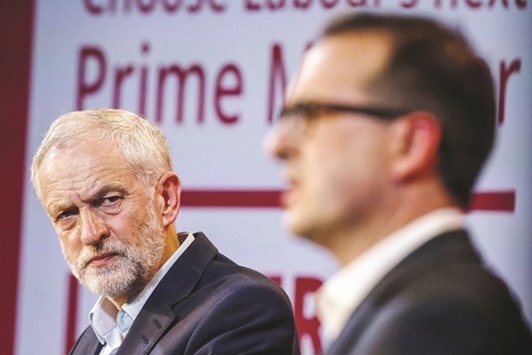The leader of Britain’s opposition Labour Party has refused to say whether he would defend a Nato ally if one was invaded by Russia.
Jeremy Corbyn was asked several times at a leadership debate in Birmingham, central England, on Thursday if he would support the military alliance’s key principle of “collective defence” where any attack on one member country is considered an attack against all members.
Corbyn declined to give any assurances that he would do so if he won power. Instead he stressed the need for diplomatic solutions, saying he wanted to achieve a world where there was no need to go to war.
“You’d obviously try to avoid that happening in the first place, you would build up a good dialogue with Russia to ask them and support them is respecting borders,” he said.
“We would try and introduce a de-militarisation of the borders between Russia, Ukraine and all the other countries down in the border between Russia and eastern Europe.”
The Labour Party has been in turmoil since Britain’s June 23 vote to leave the European Union, with veteran left-winger Corbyn’s position being challenged by fellow lawmaker Owen Smith.
Smith said he would go to the aid of a fellow Nato member.
In the past Corbyn has backed Britain’s withdrawal from Nato though more recently he has talked of a more restricted role for the alliance.
Nato’s mutual defence guarantee is a commitment that comes without any “conditions or caveats”, British defence secretary Michael Fallon said last month.
More than 1,000 Labour councillors have signed a letter of support for the Labour leadership candidate Owen Smith, representing more than 200 local authorities.
The letter, signed by representatives from England, Wales and Scotland,
says the councillors do not have faith in Jeremy Corbyn’s “weak leadership”, warning that the country faces an existential threat from the vote to leave the EU with a potential second Scottish referendum looming.
The letter, which follows a separate piece from 246 councillors endorsing Corbyn, was organised by the Nottinghamshire councillor Michael Payne and the Westminster councillor Tim Roca.
There are about 6,000 Labour councillors in the UK.
Payne said the support came from councils in a wide variety of areas,
urban and rural.
It includes councillors from traditionally leftwing areas such as Brighton and Hove, Glasgow and Liverpool.
Payne said: “Corbyn’s weak leadership risks condemning Britain to a generation of destructive Conservative rule.
Labour councillors are supporting Owen Smith because only he can unite Labour against the Tories, and lead us back to power where we can transform the lives of working people for the better.”
The letter says the councillors will be casting their votes for Smith because they see him as “the only path forward to a Labour government.”
They also warn of “militants in both wings of our party who are determined to carry out a civil war against each other, whether it harms working people or not”, and say a unifying leader was the only solution.
“We have intimidation and bullying in constituency Labour parties up and down the country,” the letter states. “We have those who seem to prefer perpetual division to the job of winning power for the good of those we represent.”
It adds: “Our country faces an existential threat from nationalists and poor-bashing Tories.
A new Scottish referendum is on the horizon.
This is no time for Labour to keep fighting itself.
The next general election has already begun.
“ Owen Smith, with his experience, especially as shadow secretary of state fighting austerity, has a firm grasp of the issues and will be prepared to lead our party from day one.”
Smith said: “Labour councils are the first-line of defence for communities which are being hardest hit by this right-wing Tory government.
We need to elect more Labour councils and councillors, but that will only be achieved if we are a radical, credible party which people trust.”
Corbyn won local party nominations by a landslide in the Labour leadership contest, with 84% of constituency nominations from those who chose to nominate.
Smith took just 53 nominations compared to 285 who backed the Labour leader, who took support from CLPs who nominated all three other candidates in 2015 — Andy Burnham, Yvette Cooper and Liz Kendall.

Jeremy Corbyn is facing a challenge from Owen Smith.
